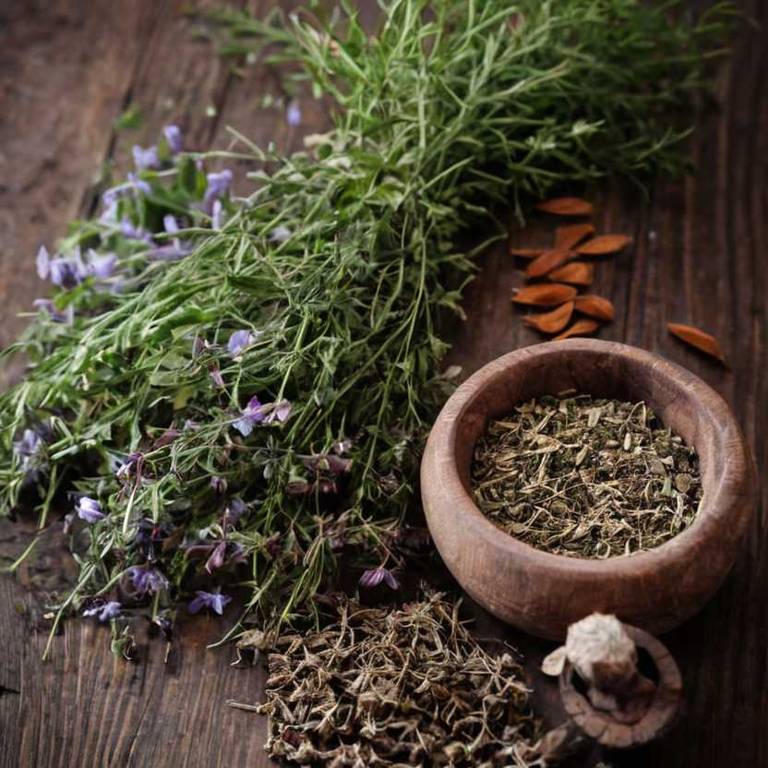10 Best Prunus Armeniaca Health Benefits

Prunus armeniaca, commonly known as the apricot, offers numerous health benefits due to its rich nutritional profile.
It is a good source of vitamins A and C, which support immune function and skin health. The fruit also contains dietary fiber, which aids in digestion and helps maintain a healthy gut. Apricots are packed with antioxidants that may reduce the risk of chronic diseases such as heart disease and cancer.
Additionally, they contain potassium, which is important for maintaining proper heart function and regulating blood pressure.
1. Improves digestion
Prunus armeniaca improves digestion by stimulating the production of digestive enzymes in the gastrointestinal tract.
The fruit's high fiber content helps regulate bowel movements and prevent constipation. Additionally, the presence of certain bioactive compounds can reduce inflammation in the digestive system. These properties make it beneficial for individuals suffering from digestive disorders such as indigestion or irritable bowel syndrome.
Regular consumption of Prunus armeniaca can contribute to overall digestive health and comfort.
2. Reduces inflammation
Prunus armeniaca reduces inflammation by containing bioactive compounds such as amygdalin and flavonoids, which have anti-inflammatory properties.
These compounds help inhibit the production of pro-inflammatory cytokines and reduce oxidative stress in the body. The anti-inflammatory effects of Prunus armeniaca may support the management of conditions like arthritis and inflammatory bowel disease. Additionally, its ability to modulate immune responses contributes to its therapeutic potential in inflammatory disorders.
As a result, Prunus armeniaca is increasingly being explored as a natural remedy for inflammation-related health issues.
3. Supports skin health
Prunus armeniaca supports skin health by providing essential nutrients that promote a healthy complexion.
The fruit is rich in vitamins A and C, which are known for their antioxidant properties that help protect the skin from free radical damage. These antioxidants can also reduce inflammation and contribute to the maintenance of skin elasticity. Additionally, the presence of beta-carotene in apricots helps in the production of collagen, which is vital for skin firmness and repair.
Overall, incorporating Prunus armeniaca into the diet can contribute to a more radiant and youthful appearance of the skin.
4. Boosts heart health
Prunus armeniaca boosts heart health by reducing oxidative stress and inflammation, which are key contributors to cardiovascular diseases.
The fruit is rich in antioxidants, such as vitamin C and polyphenols, that help protect the heart from damage caused by free radicals. It also contains dietary fiber and healthy fats that support cholesterol regulation and improve blood lipid profiles. Regular consumption of Prunus armeniaca may lower the risk of hypertension and arterial plaque buildup.
Overall, incorporating this fruit into a balanced diet can contribute to long-term cardiovascular wellness.
5. Enhances immune system
Prunus armeniaca enhances immune system by providing essential nutrients and antioxidants that support the body's natural defenses.
The fruit contains vitamins A, C, and E, which are known for their immune-boosting properties. Additionally, the presence of flavonoids and other phytochemicals helps reduce oxidative stress and inflammation, further strengthening the immune response. Regular consumption of Prunus armeniaca can contribute to the prevention of infections and the promotion of overall health.
Its ability to modulate immune function makes it a valuable addition to a balanced diet.
6. Aids in weight loss
Prunus armeniaca aids in weight loss by promoting a feeling of fullness and reducing overall food intake.
The fruit contains dietary fiber, which helps regulate digestion and can contribute to a lower calorie intake. It is also rich in antioxidants and phytochemicals that may support metabolic health and reduce inflammation. Additionally, the natural sugars in apricots are absorbed more slowly, preventing spikes in blood sugar and cravings.
Regular consumption of Prunus armeniaca as part of a balanced diet may therefore support sustainable weight management efforts.
7. Lowers cholesterol
Prunus armeniaca lowers cholesterol by containing bioactive compounds such as polyphenols and fiber, which help reduce low-density lipoprotein (LDL) cholesterol levels.
These compounds work by inhibiting the absorption of cholesterol in the intestines and promoting its excretion from the body. Additionally, the fruit's high antioxidant content supports overall cardiovascular health by reducing oxidative stress. Studies have shown that regular consumption of apricots or apricot extracts can lead to significant improvements in lipid profiles.
As a result, Prunus armeniaca is increasingly recognized as a natural aid in managing cholesterol levels and preventing heart disease.
8. Promotes eye health
Prunus armeniaca promotes eye health due to its high concentration of bioactive compounds, including vitamins A and C, which are essential for maintaining healthy vision.
These nutrients help protect the eyes from oxidative stress and support the function of the retina. The fruit also contains anthocyanins, which have been linked to improved night vision and reduced risk of age-related macular degeneration. Additionally, the presence of lutein and zeaxanthin in Prunus armeniaca further enhances its role in shielding the eyes from harmful light wavelengths.
Regular consumption of Prunus armeniaca may contribute to overall ocular wellness and reduce the risk of various eye conditions.
9. Improves mood
Prunus armeniaca improves mood by promoting the production of serotonin, a neurotransmitter associated with feelings of well-being and happiness.
The fruit contains bioactive compounds such as amygdalin, which may contribute to its mood-enhancing effects. Studies suggest that regular consumption of apricots can help reduce symptoms of mild depression and anxiety. Additionally, the high levels of vitamin C and antioxidants in apricots support overall mental health.
Incorporating Prunus armeniaca into a balanced diet may thus serve as a natural way to uplift emotional well-being.
10. Enhances brain function
Prunus armeniaca enhances brain function by providing essential nutrients that support cognitive health.
The fruit is rich in antioxidants, which help protect brain cells from oxidative stress and damage. These antioxidants may improve memory, concentration, and overall mental clarity. Additionally, the presence of vitamin C and other phytochemicals in apricots may promote neurogenesis and enhance neural communication.
Regular consumption of Prunus armeniaca can contribute to maintaining optimal brain performance and reducing the risk of age-related cognitive decline.